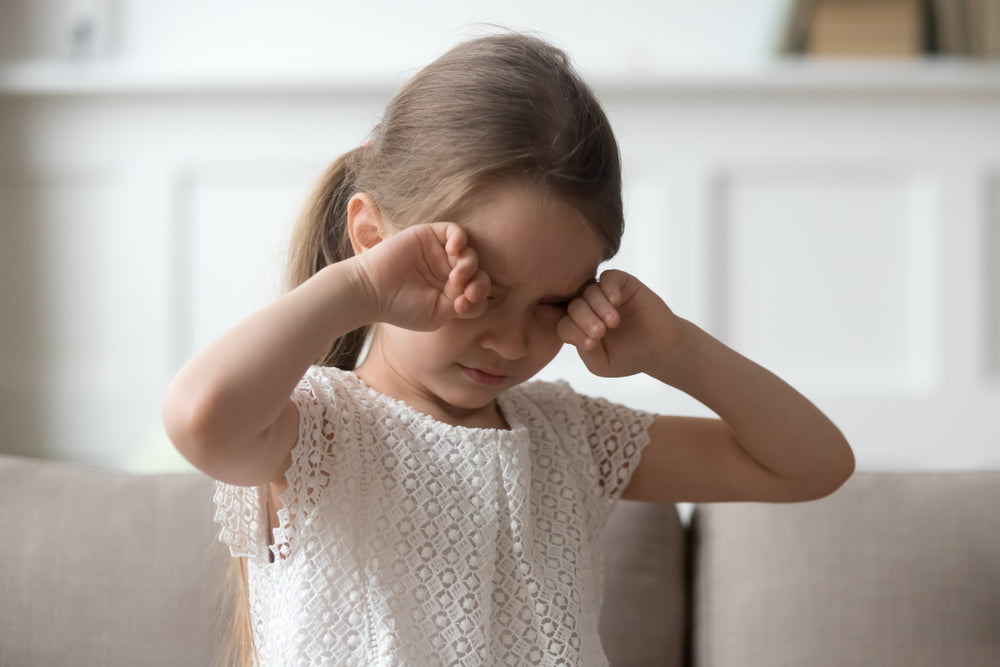Melatonin Use in Children: Can You Give a 1-Year-Old Melatonin?

Disclaimer: All content and media on the Ecoy Website is created and published online for informational purposes only. It is not intended to be a substitute for professional medical advice and should not be relied on as health or personal advice.
Melatonin is a hormone produced by our bodies to regulate sleep. Once it gets dark, the body starts producing melatonin to prepare you for bed. And while melatonin itself doesn't make you sleepy, it does make falling asleep easier and helps to maintain a healthy sleep cycle throughout your life.
However, because nowadays we're exposed to more light than ever before, coming from our apartments as well as our screens, and we also deal with an unprecedented amount of stress, the production of melatonin is not always enough to fall asleep and stay asleep.
The same goes for our kids. That's why a lot of people who experience difficulty falling asleep resort to taking melatonin supplements. These come in different shapes and sizes: chewable tablets, gummies, liquids, pills. Melatonin supplements are considered helpful for a variety of sleep disorders and sleep problems, like sleep apnea, chronic sleep-onset insomnia, jet lag, problems with sleep patterns and sleep cycles, etc.
Melatonin Use in Children
On a short-term basis, melatonin is considered safe for adults. But can we say the same for children? Well, the answer is yes, but again, only if it's used for a short amount of time. The simple reason for this is that there isn't much available data to determine the long-term effects of taking melatonin. That's why doctors usually advise that if you do decide to give your child melatonin supplementation, you shouldn't give it to them for too long.
Melatonin use can help children who are neurodivergent and have neurodevelopmental disorders such as autism and ADHD.
If your kid struggles with falling asleep, then you can first try the following things before trying any supplements:
- Make sure to help them develop good sleep hygiene. This means maintaining a consistent bedtime routine, even if they don't want to fall asleep right away.
- Don't encourage naps that last too long or that are too frequent throughout the day. Naps should last for a max of an hour (that itself is too much).
- Don't let your kid use a phone/tablet or watch something on a mobile device before bedtime.
- Make sure the lighting in your child's room is low, and make sure to turn off the lights when their bedtime routine starts.
- Find out whether there are any underlying issues that are causing your child's inability to fall asleep, like not eating enough (not getting the right nutrients), a condition, an illness that might interfere with sleep patterns, any anxiety or fear they might be feeling, and the like.
So, Can You Give Your 1-Year-Old Melatonin?
Well, the answer is yes, but as was mentioned earlier - not for too long. You should never give your kid supplements without consulting with a doctor first and making sure that they really can benefit from them.
The American Academy of Pediatrics (AAP) suggests that if parents want to give their children melatonin supplements, they should start with low doses, preferably the lowest possible. This is especially valid for babies who usually respond well to low doses (ranging from 0.5 mg to 1 mg), taken 30-90 min before bed. Most kids won't need doses that are higher than 3 or 6 mg. Higher doses are most of the time reserved for neurodivergent kids who have high stimulation thresholds.
However, some sources (Boston Children's Hospital blog) say that melatonin shouldn't be given to kids younger than three years old.
Conclusion
Generally speaking, healthy children and babies don't really need melatonin treatment to maintain a consistent bedtime routine. Baby sleep is notorious for being difficult to tame, and it's normal to change and be inconsistent as your kid grows and develops.
If you want to make sure your child gets enough sleep, avoid the use of blue light (screens), and make sure they're well-fed and not having any serious health conditions before you introduce treatment options. Also, be sure to consult with your paediatrician on what is the best approach to tackle your child's sleep issues.
Lastly, adding a Bamboo mattress topper and bamboo sheets is a great way to improve the comfort level of your child's bed.
Sources:
- https://www.ncbi.nlm.nih.gov/pmc/articles/PMC3047226/
- https://www.mayoclinic.org/healthy-lifestyle/adult-health/expert-answers/melatonin-side-effects/faq-20057874
- https://www.hopkinsmedicine.org/health/wellness-and-prevention/melatonin-for-sleep-does-it-work
- https://edition.cnn.com/2021/03/22/health/melatonin-safe-for-kids-wellness/index.html
- https://www.healthychildren.org/English/healthy-living/sleep/Pages/Melatonin-and-Childrens-Sleep.aspx
- https://answers.childrenshospital.org/melatonin-for-children/
- https://pubmed.ncbi.nlm.nih.gov/23098680/
